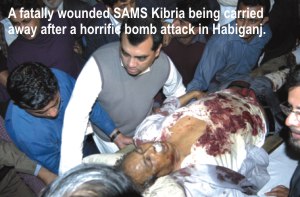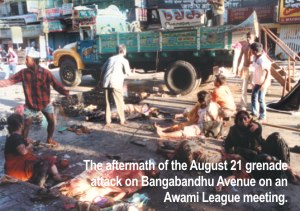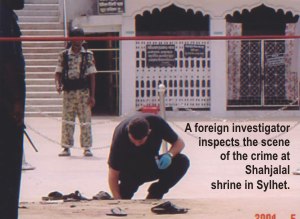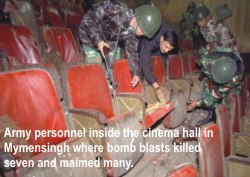|
Cover
Story
 A
Campus A
Campus
on Edge
Shamim
Ahsan and Kajalie Shehreen Islam
On
the evening of February 14, Dhaka University (DU) looked like
anything but a university campus. The previous day had been
a festive one, with Pahela Phalgun being celebrated by yellow-saree-clad
women, people coming to watch the film festival at the Teachers-Students
Centre (TSC) and hordes of others pouring into the nearby
Ekushey Boi Mela. That very day, the grounds had been filled
with happy young people meeting up and celebrating a day of
love, enjoying mock debates centring on the theme and just
hanging out with friends when, all of a sudden, the celebrations
turned into a chaotic tragedy.
Whether
it is to welcome the New Year or celebrate the national cricket
team's memorable victory, TSC has become the venue that pulls
the biggest crowds. No wonder that Valentine's Day or the
World Love Day programme attracted a few thousand youths to
TSC where a stage was raised in front of the Swoparjito Swadhinota
for a mock debate by the Dhaka University Debating Society
(DUDS).
"There
were lots of people," says Saiful, a fourth year student
of mass communication and journalism, "lots of outsiders
too, and everyone was just having fun."
 At
around 7:25 pm, during the second part of the programme, a
parliamentary style debate on "recognising love as a
constitutional right" was in progress. Just as the opposition
leader had begun to speak, there was a loud sound. Most people
thought it was a tyre busting and just ignored it. The debate
resumed. At
around 7:25 pm, during the second part of the programme, a
parliamentary style debate on "recognising love as a
constitutional right" was in progress. Just as the opposition
leader had begun to speak, there was a loud sound. Most people
thought it was a tyre busting and just ignored it. The debate
resumed.
But when
the next three explosions happened right in their midst at
an interval of 20 to 30 seconds, people started to run, leaving
behind sandals and bags, taking refuge inside the TSC, nearby
residential halls and anywhere else they could hide. The fifth
blast took place 15 to 20 yards from the stage. Three unexploded
bombs were also later found in the area.
"When
the first bomb went off near the Central Library, we thought
they were fire-crackers," says Saiful. "It was only
when one exploded six or seven feet from me, in front of DUS
(Dhaka University Snacks), that I realised it was a bomb.
I fell trying to save a friend and we got trampled on. Everything
went dark."
 Within
seconds, the panic-stricken crowds were running helter-skelter
in all directions, not realising where they would be safe.
Many fell on the street from the pushing and shoving, especially
women who were wearing saris. They screamed and begged for
help, but no one looked back. Within seconds, a long patch
of the street in front of the Swoparjito Swadhinota and the
beautiful island-like lawn before the DUS that were filled
to the brim with jubilant crowds became empty. The street
was littered with sandals and shoes, wallets, money, torn
pages of books and cards. Around 12 people were injured by
splinters while some 40 were hurt in the stampede that followed
the blasts. Within
seconds, the panic-stricken crowds were running helter-skelter
in all directions, not realising where they would be safe.
Many fell on the street from the pushing and shoving, especially
women who were wearing saris. They screamed and begged for
help, but no one looked back. Within seconds, a long patch
of the street in front of the Swoparjito Swadhinota and the
beautiful island-like lawn before the DUS that were filled
to the brim with jubilant crowds became empty. The street
was littered with sandals and shoes, wallets, money, torn
pages of books and cards. Around 12 people were injured by
splinters while some 40 were hurt in the stampede that followed
the blasts.
"I
thought I was going to die," says Mustafiz, a Master's
student of social welfare and vice-president of DUDS, who
was on stage when the explosions happened. "When I saw
that I was okay, I started looking for my friends." Three
or four of Mustafiz's club members were injured in the blasts.
Casualty-wise,
it wasn't as devastating as other recent incidents, but impact-wise
it was. The several thousand people who witnessed the attack
and those horrific moments after being bombarded from what
seemed like all around, are not likely to forget that evening
anytime soon. As they relate their experiences, it is obvious
that the trauma is still fresh.
Except
for two female students of DU and a young man who were under
treatment at Dhaka Medical College Hospital (DMCH), others
received mild injuries and were released later that evening
after receiving first aid.
 A
day after the attack, 25-year-old Md. Shahin Mia lies wounded
in Ward 32, surrounded by relatives. There are quite a few
bloody spots from his left knee down to the ankle. The skin
on those spots is torn vertically. He has already undergone
a small operation in the morning (February 15) and has had
2 tin splinters removed from there. His relatives say he has
another splinter a little over his left ankle, which the doctors
thought would be better left alone for the time being. He
also shows the bandaged back part of his right thigh that
shows a splinter wound. A
day after the attack, 25-year-old Md. Shahin Mia lies wounded
in Ward 32, surrounded by relatives. There are quite a few
bloody spots from his left knee down to the ankle. The skin
on those spots is torn vertically. He has already undergone
a small operation in the morning (February 15) and has had
2 tin splinters removed from there. His relatives say he has
another splinter a little over his left ankle, which the doctors
thought would be better left alone for the time being. He
also shows the bandaged back part of his right thigh that
shows a splinter wound.
The attending
nurse assures that these are not serious injuries. Her consolation
is not lost on Shahin who appears enlivened by this revelation.
One of his relatives, Farid (not his real name), a DU student,
reveals that Shahin came to the campus to see him and stood
among the crowd enjoying the debate as he just came across
it on his way to SM hall where Farid resides.
Shahin
is apparently alright but seems a little disoriented when
answering questions. The attending doctor believes the trauma
he went through hasn't left him yet and might take years to
get over.
He remembers
the moment he received the injury. "I was standing about
a hundred feet away from the stage. Suddenly, I felt something
blast right beneath my feet, as if I had trampled on it somehow,
making a big sound," he says. Though he claims he didn't
lose consciousness, he doesn't remember what happened after
he was hit except that his eyes were burning and that after
a while he was carried by some unknown faces.
 Fatematuzzohora
Tuhin, a second year student studying Arabic literature, and
Halima Akhter Deepa, a second year philosophy student, both
of whom have sustained injuries on the lower parts of their
legs, are in the same cabin, No 30, on the second floor, at
DMCH. They are friends and on that fateful evening they had
gone to the programme just a couple of minutes before the
bombs started exploding. Since Tuhin is a member of DUDS,
she and her friend found a place on one corner of the stage. Fatematuzzohora
Tuhin, a second year student studying Arabic literature, and
Halima Akhter Deepa, a second year philosophy student, both
of whom have sustained injuries on the lower parts of their
legs, are in the same cabin, No 30, on the second floor, at
DMCH. They are friends and on that fateful evening they had
gone to the programme just a couple of minutes before the
bombs started exploding. Since Tuhin is a member of DUDS,
she and her friend found a place on one corner of the stage.
"We
had just taken our seats and asked one of the volunteers who
was standing near us what the topic was and after he had said
only one or two words I was deafened by a huge sound,"
Tuhin says.
Her
friend, Deepa, who was sitting right beside her says, "For
a second I didn't know what was going on and what I should
do. At first I could not see anything as there was thick smoke
all around. The moment I regained my senses I jumped down
from the stage and started to run in the direction of Rokeya
Hall. As I was running there were at least three more blasts
and all of them seemed to have happened right beside me. When
I reached near the hall gate, a man stopped me and showed
me that my shalwar had caught on fire," she
says.
Their
injuries are not serious either and they will recover soon,
but they probably won't ever forget the hellish moments they
experienced that evening. "I have never been so scared
before. As I was trying to work out in which direction I should
run in the smoke, it seemed to me I was dying," relates
Tuhin.
Needless
to say, for most people, the incident was shocking. Most students
spent the next day calling home to inform their families that
they were alright.
"I
just don't go to public gatherings of any sort anymore,"
says a shocked Farhan, a student of the university.
 Interestingly,
Farhan says that when he was passing through the place of
the disaster later that night, there was no electricity in
the area and people were cleaning up the scene of the crime.
The next morning, there was no trace of the tragedy, and,
some say, no evidence either. Interestingly,
Farhan says that when he was passing through the place of
the disaster later that night, there was no electricity in
the area and people were cleaning up the scene of the crime.
The next morning, there was no trace of the tragedy, and,
some say, no evidence either.
An explosives
expert related to Shumon, a fourth year DU student, who reached
the scene 10 or 15 minutes after it happened, that the bombs
were Improvised Explosive Device. If put on the ground, they
would be set off by any sort of vibration. In his opinion,
such explosives would not kill or severely injure anyone but
give out a lot of smoke and noise, to, basically, disperse
crowds.
"I
have a feeling this was just an experiment," says Shumon,
"to see how people react. Perhaps something that might
be applied later."
Shumon
does not seem visibly traumatised by the incident. It has
just become too common, he says. But, like most people, he
is obviously frustrated.
"I
was sitting outside the Boi Mela the day after the incident,"
he says, "having tea at a stall. The tea-seller was saying
that sales had been low that day because hardly anyone came
to the mela. A bearded man, around 40, said he wished
that three or four people had been killed in the Valentine's
Day blasts."
What
surprised most people was that, despite extra security on
campus that day with the hartal and the book fair
going on, something like this could have happened. The police
and Rapid Action Battalion (RAB) proved ineffective in preventing
the attack. Though everyone going to the Boi Mela had to go
through a metal detector, people attending the Valentine's
Day celebrations didn't go through any sort of security check,
as has become routine for most celebrations after the Ramna
Botomul blasts in 2001.
Most students
don't seem to think that the attacks were carried out by any
large organisation, but, perhaps a small group that just does
not like the concept of Valentine's Day.
"They
may not even be religious extremists," says Farhan, "rather,
some random people who want to take advantage of their reputation."
Farhan does not believe that the attacks were in any way related
to the August 21 carnage or the Habiganj blasts that killed
AL leader SAMS Kibria. "It might even have been one of
the student organisations," he adds.
 Whoever
the culprit, as always, the general students of Dhaka University
are the ones to suffer. Two days of strike have already been
enforced by the Anti-Communalism and Anti-Terrorism Alliance,
consisting of the student front of the Awami League, Bangladesh
Chhatra League (BCL), BCL Jasad, Chhatra Dhara (student front
of Bikalpo Dhara Bangladesh), Chhatra Samity, Chhatra Oikkyo
and Chhatra Moitree, with threats of an impending indefinite
strike if one of the arrested BCL leaders is not released.
Tension rules at the university residential halls where the
different student organisations are at daggers with each other,
with hardly any atmosphere for co-existence. Whoever
the culprit, as always, the general students of Dhaka University
are the ones to suffer. Two days of strike have already been
enforced by the Anti-Communalism and Anti-Terrorism Alliance,
consisting of the student front of the Awami League, Bangladesh
Chhatra League (BCL), BCL Jasad, Chhatra Dhara (student front
of Bikalpo Dhara Bangladesh), Chhatra Samity, Chhatra Oikkyo
and Chhatra Moitree, with threats of an impending indefinite
strike if one of the arrested BCL leaders is not released.
Tension rules at the university residential halls where the
different student organisations are at daggers with each other,
with hardly any atmosphere for co-existence.
The usual
investigating committee has been formed, headed by Pro-Vice-Chancellor
Prof Yusuf Haider, but has not yet made any headway. In the
meantime, students remain scared, anxious and on edge -- as
does the whole country, it seems -- almost as if waiting for
the next attack.
Seven
days into the TSC bomb blast, the police are yet to make any
breakthrough. SI Naser, the Investigation Officer says the
probe is on, but refuses to say if they have made any progress.
In the
meantime, three madrassa students were arrested from the Ekushey
programme at Jahangirnagar University (JU). They were found
with a timer and an audio tape of a speech by an unknown religious
cleric defending Osama bin Laden, Mufti Amini and Shaikhul
Hadith.
As
the TSC bomb blast occurred after a series of bomb blasts
and grenade attacks over the last few years, there is a general
tendency to link them. After some 20 such incidents since
1999, the terror of bomb attacks never seemed so real before.
We are living with the fear of the next attack; we just don't
know when and where it will happen. The fact that the much
hyped RAB was in charge of security along with the regular
forces shows how insecure we are. Many have vowed to avoid
any type of gathering, but that is not a realistic solution.
The obvious remedy is to catch the perpetrators and bring
them to justice. Everybody knows this but nothing is happening
to that end.
 Living
in a Living
in a
Tinderbox
Ahmede
Hussain
While
all the major political parties remain indifferent, ordinary
citizens have been trying to come to terms with the bomb blasts
that have created a sense of panic in this dangerously divided
society.
Twenty-four-year old Moumita Chowdhury was
talking to her fiance at a Pahela Baishakh gathering when
a bomb went off in Ramna Green in 2001. Panic gripped her
and she ran for cover as a string of blasts soon followed.
Shrapnel hit her left thigh when a bomb exploded in an abandoned
package a few paces away.
Moumita, then a student of economics, was
taken to a private clinic where her left leg was amputated.
Four years after that traumatic incident she is still trying
to grapple with life. Her fiance left her immediately after
the surgery; and Moumita, a budding Rabindra Sangeet artiste
at that time, quit singing. "I know my life will not
be the same again," she says.
Like several other blasts that have ripped
through the country in the last 10 years, police investigation
into the blasts has failed to make any significant headway.
 The
subsequent governments' failure to bring the culprits to book
has given birth to widespread rumours. Of them, a long-running
conspiracy theory, primarily aimed at the ruling BNP-led coalition
government, blames Islamic extremists for the attacks. In
its full five-year term, the Bangladesh Awami League (AL)
could not nab the culprits behind the blasts, but this did
not deter the party from speculating about the identity of
the culprits. Fearing an electoral defeat to the BNP, the
AL fed several rumours before the 2001 general elections that
pointed the finger at BNP's electoral allies Jamaat and Islamic
Oikkya Jote. The
subsequent governments' failure to bring the culprits to book
has given birth to widespread rumours. Of them, a long-running
conspiracy theory, primarily aimed at the ruling BNP-led coalition
government, blames Islamic extremists for the attacks. In
its full five-year term, the Bangladesh Awami League (AL)
could not nab the culprits behind the blasts, but this did
not deter the party from speculating about the identity of
the culprits. Fearing an electoral defeat to the BNP, the
AL fed several rumours before the 2001 general elections that
pointed the finger at BNP's electoral allies Jamaat and Islamic
Oikkya Jote.
The AL, however, failed to get the cutting
edge over its archrival in the general elections. The BNP,
with the help of its Islamic allies, came back to power riding
an electoral landslide; and blasts, meanwhile, have continued
to rock the country at a regular interval.
Another conspiracy theory has taken birth
at the ruling Bangladesh Nationalist Party (BNP) headquarters.
To repel a barrage of local and international criticism that
accused the party for being lenient with the religious fundamentalists,
the BNP shifted the blame on the AL. Immediately after coming
to power in 2001, the party blamed the AL for planting bombs
in public places to portray the country as a haven for Islamic
extremists. This disturbing trend repeated itself when grenades
were thrown at Sheikh Hasina, the leader of the opposition,
at a rally in Dhaka on August 21 last year.
In fact, in the aftermath of the killing of
the former finance minister SAMS Kibria, in a characteristic
display of arrogance, the BNP has blamed the AL for taking
the injured leader to Dhaka on a microbus, instead of waiting
in Habiganj for the government-sent helicopter to come. The
party has never publicly apologised, though local newspapers
have found that it was the government that took an unusually
long time to make any decision about sending a helicopter
for the injured AL-leader. In fact, investigation shows that
the government never really informed the AL or Kibria's family
about the availability of the helicopter, if such a decision
was taken at all.
Though 22 AL-workers, including party leader
Ivy Rahman, died in the August 21 blasts, questions were raised
by some BNP members as to how Hasina survived the mayhem when
so many people had died.
 Bomb
attacks, meanwhile, have continued; on February 16, eight
people were critically injured in two identical bomb attacks
on two BRAC offices in Naogaon and a branch of the Grameen
Bank in Sirajganj. Three grenades were later recovered from
another BRAC office. Bomb
attacks, meanwhile, have continued; on February 16, eight
people were critically injured in two identical bomb attacks
on two BRAC offices in Naogaon and a branch of the Grameen
Bank in Sirajganj. Three grenades were later recovered from
another BRAC office.
Public opinion about the blasts has remained
dangerously divided in a country where politics dominate people's
lives. In the absence of any proper investigation, rumour
has remained people's only source of information.
Brig Shahedul Anam Khan, a security analyst,
thinks both the major political parties' indifference is helping
the culprits to get away with the crime.
"The AL has never been serious in its
claim; if they had really believed what they say now, they
would have been able to arrest some zealots while they were
in power. The BNP, on the other hand, has been amazingly soft
on the extremists. Otherwise, how would you explain the fact
that when the whole world believes in the presence of religious
extremists in the country, why would the BNP try to hush this
thing up?" Anam asks.
In fact, as the history of these blasts go,
both the parties' ambivalent political stance has been the
prime hindrance to a proper investigation.
"The government, it seems, does not want
to run an independent investigation as they fear it will open
a whole new Pandora's box.
"How can one expect the police to nab
the culprits when the prime minister herself thinks the AL
is behind the killing?" Anam asks.
 The
government has remained conspicuously silent when the so-called
Jagrata Muslim Janata Bangladesh (Awakened Ordinary Muslims
of Bangladesh; JMJB) has been killing ordinary citizens in
the name of Islam. Though the PM has ordered a crackdown on
the militant outfit, the police have failed to arrest Bangla
Bhai, the so-called operations commander of the JMJB. The
government has remained conspicuously silent when the so-called
Jagrata Muslim Janata Bangladesh (Awakened Ordinary Muslims
of Bangladesh; JMJB) has been killing ordinary citizens in
the name of Islam. Though the PM has ordered a crackdown on
the militant outfit, the police have failed to arrest Bangla
Bhai, the so-called operations commander of the JMJB.
Lately the police have made some arrests,
and of them, Shafiqullah, a member of the JMJB, has confessed
the party's link to some blasts that took place across the
country.
"The JMJB is determined to carry on attacks
on all forms of anti-Islamic activity until an Islamic revolution
takes place in the country," he says in a statement given
to a First Class Magistrate. He admitted that JMJB had been
responsible for a number of bomb attacks on NGOs.
Farman Ali, another JMJB member who was arrested
in Natore, told the police that JMJB operatives regularly
held meetings at the Baitul Mukarram Mosque and Kakrail Mosque
in Dhaka to chalk out their plans.
 In
fact, alarm bells were raised on September 19, 2003, when
police arrested Maulana Abdur Rauf, leader of Jamiatul Mujaheedin
Bangladesh (JMB), along with his 17 accomplices. Though Rauf
confessed to going to Afghanistan to fight for the Talibans,
the militant leader was later granted bail. The police, too,
have lost tab on him, and recent arrests made by the police
suggest that Rauf is back to where he belongs-- different
madrassas across the country to train aspiring militants. In
fact, alarm bells were raised on September 19, 2003, when
police arrested Maulana Abdur Rauf, leader of Jamiatul Mujaheedin
Bangladesh (JMB), along with his 17 accomplices. Though Rauf
confessed to going to Afghanistan to fight for the Talibans,
the militant leader was later granted bail. The police, too,
have lost tab on him, and recent arrests made by the police
suggest that Rauf is back to where he belongs-- different
madrassas across the country to train aspiring militants.
The recent arrests also make a surprising
revelation. "Dr Asadullah Al Galib, a teacher at the
Arabic department of Rajshahi University, is involved with
the JMJB and is leading it towards an Islamic revolution,"
Shafiqullah told the police. Farman Ali, too, says that Dr
Galib is the regional commander (South) of the group.
"I was introduced to Galib and Shahi
Bhai (Abdur Rahman, leader of JMB), at a religious programme
in a graveyard in Narayanganj and we discussed ways to bomb
anti-Islamic programmes in the country," Farman says.
 The
story took a dramatic turn on February 17 when a docket containing
Shafiqullah's confessional statement went missing from the
court in Bogra. Sources said a top staff of the Bogra police
took the docket to the office of the Superintendent of Police
(SP), though the SP does not have any authority to read any
confessional statement. Police, however, told journalists
that they know nothing about its whereabouts. The
story took a dramatic turn on February 17 when a docket containing
Shafiqullah's confessional statement went missing from the
court in Bogra. Sources said a top staff of the Bogra police
took the docket to the office of the Superintendent of Police
(SP), though the SP does not have any authority to read any
confessional statement. Police, however, told journalists
that they know nothing about its whereabouts.
Though both Shafiqullah and Farman's confessions
implicate Dr Asadullah Al Galib as a terrorist, the professor
remains a free man. "Of course we have political ambitions
for an Islamic state, but we don't follow traditional politics.
We have our Islamic way of invitation and Jihad, which is
devoid of terrorism. We will continue our movement unto death,"
Dr Galib tells journalists.
Copyright
(R) thedailystar.net 2005
|
